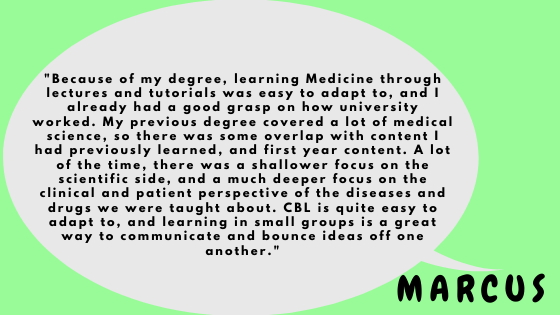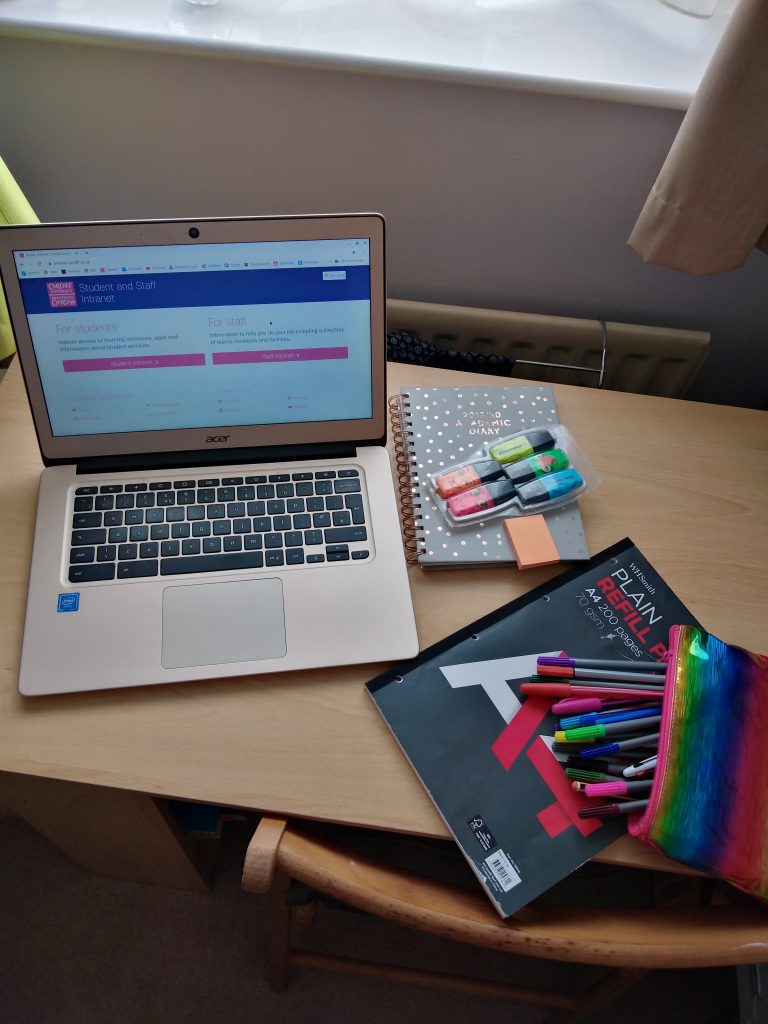PART 4: What’s it like dealing with the workload?
8 Ebrill 2020
So finally for the last part of this subseries, I just wanted to delve deeper into what the transition was like for me straight from A levels to 1st year medicine. I will be looking at some of the differences that I found, which I hope will be useful!

The transition, in terms of the timetable of PCS, was not too much of a big deal for me, because I had done 4 A levels so I was used to having full days. However, this time my focus would be on one subject, which I have to admit I did have doubts about at first. This was because I like to learn lots of different things, my attention span fades if I focus on one subject for a long time, but medicine was completely different. There are so many different aspects to the course, which has made it so enjoyable so far, such as the opportunity to do full body dissection, CBL, placement and a variety of content.

So how much is there to learn?
I am asked this question very often, but in actual fact, I cannot give a definitive answer. Hanna has picked up on a key point about the workload. The fact is the workload is dependent on how much time you put into it! I found it weird at first not having a syllabus to check I had learnt everything. I found it hard to accept that you can never actually know EVERYTHING, because there are just so many different aspects to the human body and more is always being discovered. That being said, I definitely did not feel that I was thrown into the deep end – I felt supported by guidance of learning outcomes and materials for pre-reading.
So what is it like learning anatomy?
Learning anatomy was the biggest change for me in the transition, as I had not done much of it at A level. The Anatomy Centre department are absolutely outstanding in the support they give you with preparatory materials for dissections. Being a lover of textbooks, I had not previously used as many videos to help me with learning, but in anatomy, these were great to help picture structures in 3D, but also how they would look in a cadaver. I still used my anatomy textbook, which I still use to this day, but I realised that some of the coloured illustrations in anatomy textbooks can be misleading to what it is like in reality. For example, I had always thought arteries were red, veins were blue, nerves were yellow. It was to my surprise there was not this distinction in reality in full body dissection!

So how do you prepare for everything?
You may already find that you are used to pre-reading before a lesson to get an understanding of a topic and that is GREAT! It is a very pro-active way of learning and trust me it is necessary in order to deal with the workload, but to get the most out of smaller group sessions such as tutorials, you have to be prepared. Again, I have to admit I had not done this at A level unless prompted to. I was very much used to walking into a lesson and being taught a new concept for the first time. In medicine, as much as I appreciate lectures introducing content, I tried to make sure that I had least read over the slides beforehand, or skimmed a chapter of the topic, because this made the lecture easier to follow and with the majority of lectures being recorded, questions are usually asked at the end.
However, as Emilia has said, you are sitting in a lecture theatre of 300 people and so I always felt a bit of pressure with so many people seeing you walk down to the front. Honestly you get over that fear so quickly and it is worth asking a quick question there and then to get immediate answer. Most lecturers provide their email for you to ask any follow-up questions and are very supportive. There is also chance to ask more questions, during case wrap-up sessions in CBL.
There are usually suggested recommended materials in PCS and also in CBL, there is a fantastic reading list which helps to identify specific textbooks which will help for each specific case. Not everything will be taught verbatim for you, a foundation is set for you to explore for yourself and understand concepts – hence the idea of self directed learning!

If you are a graduate reading this thinking about applying for A100 5 year course or A101 4 year course (if eligible), here is great encouragement from Marcus, that actually adapting from a previous degree is smooth! You will already have your own way of working and note-taking – it is mainly the case of learning some new content, depending on your degree as well as being introduced to the interactive, clinical side of medicine.
So how do you make notes?
Again, I cannot stress this enough that there is no right way of doing this, because everyone develops their own style of learning. I used the first few weeks of PCS to figure out how I was going to approach it. I was always used to handwriting from A Level, and I tried to handwrite in lectures and found I just couldn’t hack it. Some of my friends (shoutout to my friend Lara) have handwritten throughout Year 1 & 2 and they have such an efficient way of doing so, by only writing the key info that is not already on the slides and extra explanatory content.

For many, including myself, typing in lectures was the easiest thing to do in order to keep up. I never thought I was a fast typer but by the end of a term, trust me your typing speed increases incredibly! Quick shoutout to my chromebook which has an amazing battery – a rare find amongst hundreds of Macbooks in lectures! However, I did find that the best way for me to consolidate what I had learnt in a lecture was to write it out or produce a spider diagram/ schematic of key content and also make flashcards. I LOVE A4 plain paper – I just love the freedom to present content colourfully and link subtopics together. That being said, I found that the way I made notes varied per topic and even now in Year 2, my learning style has evolved as well – for example, some topics I collate notes in a Google Doc and just print them out, annotate and highlight.
So do you get homework?
Another common question I get is about homework. I’m happy to announce that assignments work differently than they did at A level! In a way, you could class the pre-reading as homework as it is something you tend to do when you’re not in session, but in terms of marked work, they are not as often compared to A level! I have enjoyed the assignments as they have been useful in developing academic skills such as literature searching using databases such as MEDLINE as well as important reflective writing skills. In Year 1, I also had the opportunity to do group presentations as well – another way of developing communication skills. Assignments are usually spread out and given plenty of time to complete in SSC (student selected components) weeks. Even from Year 1, there is so much choice of what you can do for them.
After reading this, you may feel excited or even overwhelmed, but one thing I must stress to end this subseries is the importance of a work-life balance! It is so achievable with so many societies to get involved with extracurricularly. There are even medic societies and volunteering opportunities which work to fit around your timetable, if you are worried that you won’t have the time. Yes – studying medicine is hard work, but you have make the most of the time you have at university and have some fun as well!

I hope I have been able to give you a better insight into aspects of dealing with the workload and please feel free to ask more questions by commenting below or messaging me on my Unibuddy account. Go back to the intro blog to find the other parts of the subseries!
- Advice for Students
- After University
- Ail flwyddyn
- Application Process
- Application Process
- Applying to University
- Arian
- Aros gartref
- Astudio
- Byw oddi cartref
- Cardiff University Experiences
- Chwaraeon
- Clearing
- Clybiau a chymdeithasau
- Cooking
- Cyd-letywyr
- Cymraeg
- Darlithoedd
- Dim ond yng Nghaerdydd
- Exams
- Global Opportunities
- Guest posts
- Heb ei gategoreiddio
- Medic Tips
- Mynd allan
- Neuaddau Preswyl
- Open Day
- Opportunities
- Postgraduate Study
- Rhentu tŷ
- Student Heroes
- Student Life
- Studying Online
- Swyddi a phrofiad gwaith
- Teithio
- Things to do in Cardiff
- Top Tips
- Trydedd flwyddyn
- UCAS Application
- Why University?
- Ymgartrefu